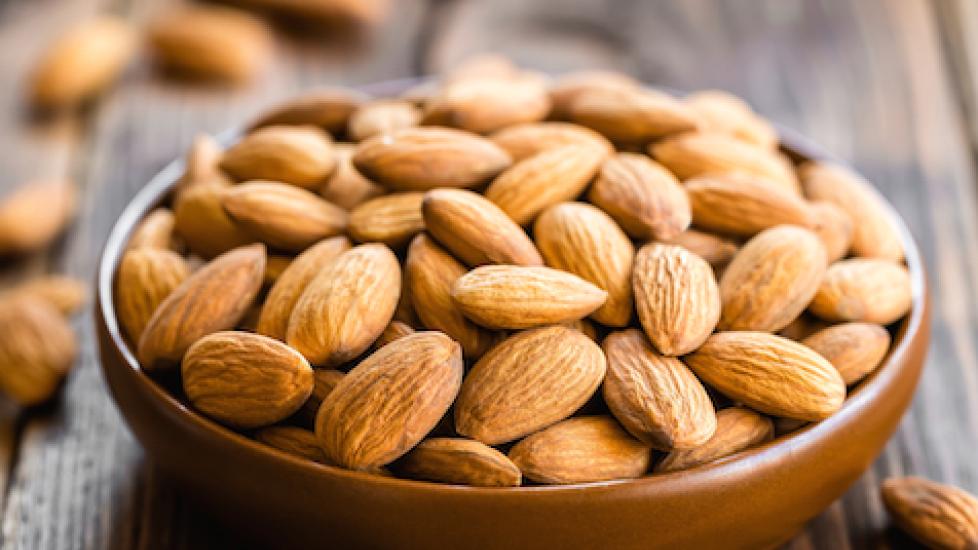Can Dogs Eat Almonds?
NOTE: Always check with your veterinarian first before giving your dog any new foods, especially “people foods.” What might be okay for one dog might not be good for your dog, depending on multiple factors, such as their age, health history, health conditions, and diet. Dogs on prescription diets should not be fed any food or treats outside the diet.
Dogs may find anything you’re eating just as desirable as a juicy New York strip steak—even if it’s a couple of banana slices or a handful of nuts! But the reality is, our pups can’t take a bite out of everything we eat—and when it comes to nuts, some kinds can actually be toxic.
“Nuts that are toxic to dogs and are a definite ‘no’ include the walnut family and pecans,” explains Dr. Richard Goldstein, chief medical officer at the Animal Medical Center in NYC.
“The most commonly toxic nuts are macadamia nuts, which can cause vomiting, tremors, increased body temperature, and inability to walk,” adds Dr. Maritza Perez, DVM, from the West Orange Animal Hospital in New Jersey.
But what about almonds; are they off-limits for dogs too?
The short answer is yes. While almonds aren’t toxic to dogs, says Goldstein, they can pose potential health problems for dogs and should be avoided.
Are Almonds Bad for Dogs?
In general, you should not let your dog eat almonds. Here are a few hazards that might come along with your pup chomping down on an almond.
Obstruction Hazard
Dogs don’t chew their food like humans do. So if they swallow the almond whole, it could lead to potential life-threatening obstructions of the esophagus, stomach, small intestine, or even the windpipe if aspirated in small breed dogs, says Goldstein.
Potential Severe Gastro-Intestinal Upset
“Almonds are high in fats and can cause a flair-up of pancreatitis in some dogs,” says Perez. Some signs of pancreatitis are vomiting, diarrhea, loss of appetite, and lethargy. Pancreatitis can look like simple indigestion at first, but become severe and lead to a fatal disorder. When suspected, pancreatitis should be properly diagnosed and aggressively treated by your veterinarian.
Possible Water Retention
“Almonds, like many packaged nuts, are often heavily salted, and this intake of salt can cause increased water retention in dogs, which is particularly dangerous in dogs with heart disease,” explains Perez.
What To Do if Your Dog Eats Almonds
Pets of different sizes may react completely differently to identical quantities of ingested nuts. If your Saint Bernard chows down on a couple of almonds and isn’t presenting any signs of choking or an obstruction, there’s little cause for concern. But if your adventurous eater is a Yorkie, it’s a different story.
“If you think you pet just ate that five-pound bag of almonds that you left by the sofa, the most effective treatment is to induce vomiting if the ingestion occurred within the previous 30 minutes,” says Perez. To do this, you need to take your dog to the vet immediately so they can oversee the process.
If you don’t know when the nuts were eaten, then the only option is to monitor your pet for signs of illness. If your pet becomes ill, call your veterinarian and make an appointment immediately. Signs to look out for include:
If there are no signs of distress and you believe your dog only ingested a few almonds, the dog is most likely OK and can be watched at home, says Dr. Richard Goldstein.
Can Dogs Have Almond Butter?
Because almonds aren’t toxic to dogs, does that mean they’re OK to eat in non-nut form? Like butter?
Almond butter is not toxic, but it can contain additives that can harm your pup including salt, sugar, or xylitol. It’s also high in fat, which isn’t the best for your dog. But while you shouldn’t give your dog free reign with the almond butter jar, it can be a good vehicle for giving your dog a pill or as a special treat, just like peanut butter.
Can Dogs Have Almond Milk?
A small amount of almond milk is OK for your dog to lap up after a spill, but you shouldn’t give it to your pet as a treat. It’s high in fat and can lead to diarrhea, pancreatitis, and obesity.
By Caitlin Ultimo
